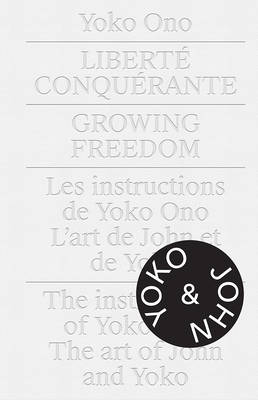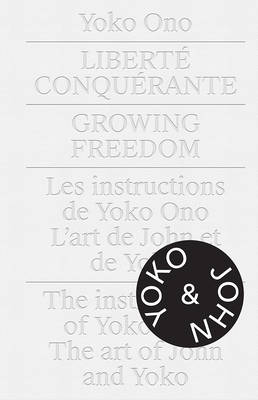
- Afhalen na 1 uur in een winkel met voorraad
- Gratis thuislevering in België vanaf € 30
- Ruim aanbod met 7 miljoen producten
- Afhalen na 1 uur in een winkel met voorraad
- Gratis thuislevering in België vanaf € 30
- Ruim aanbod met 7 miljoen producten
Zoeken
Yoko Ono.Growing Freedom
Liberté Conquérante / Growing Freedom
Cheryl Sim, Gunnar B Kvaran
Paperback | Engels
€ 19,95
+ 39 punten
Omschrijving
Yoko Ono is a leading experimental and avant-garde artist. In Tokyo during the 1950s, she introduced original questions about the concept of art and the art object, breaking down the traditional boundaries between branches of art. She has since been associated with conceptual art, performance, Fluxus, and 1960s happenings--one of the few women to participate in these movements. Through her performances and activism, she created a new kind of relationship with both spectators and fellow artists--including her late husband, John Lennon--by inviting them to play an active part in the creative process. In addition, her influence brings together Eastern and Western cultures, which extend and strengthen each other in continuous innovation. Accompanying a major new exhibition of Ono's work at the Phi Foundation for Contemporary Art in Montreal, this book underscores the cornerstones of action, participation, and imagination in the work of this fascinating artist. Essays by Cheryl Sim, Gunnar B. Kvaran, and Caroline Andrieux first engage with Ono's instruction works and emphasize the role of the visitor in their completion. They then present the collaborative projects for peace undertaken by Ono and Lennon, including the Acorn project, the War is Over peace campaign, and their "Bed In" projects, which took place fifty years ago. Ultimately, Yoko Ono seeks to impart the artist's massive impact on contemporary art practices, art reception, and activism through art. Yoko Ono brings to life not only the urgency and spirit of Ono's work, but also her belief in the importance of non-violent action to inspire political and social change.
Specificaties
Betrokkenen
- Auteur(s):
- Uitgeverij:
Inhoud
- Aantal bladzijden:
- 112
- Taal:
- Engels
Eigenschappen
- Productcode (EAN):
- 9783777433240
- Verschijningsdatum:
- 20/12/2019
- Uitvoering:
- Paperback
- Formaat:
- Trade paperback (VS)
- Afmetingen:
- 127 mm x 196 mm
- Gewicht:
- 340 g

Alleen bij Standaard Boekhandel
+ 39 punten op je klantenkaart van Standaard Boekhandel
Beoordelingen
We publiceren alleen reviews die voldoen aan de voorwaarden voor reviews. Bekijk onze voorwaarden voor reviews.











